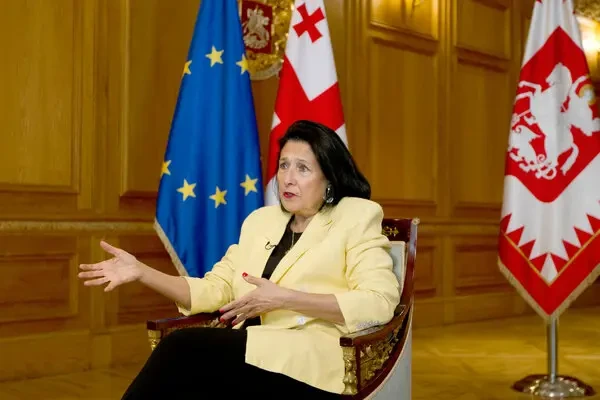Georgia president asks top court to annul 'foreign influence' law

Stay tuned with 24 News HD Android App

Georgian President Salome Zurabishvili on Monday asked the country's top court to annul a controversial "foreign influence" law that has sparked mass protests and condemnation from the West.
Initiated by the ruling Georgian Dream party, the law was adopted in May despite weeks of unprecedented street protests and warnings it would undermine Tbilisi's bid for EU membership.
The law, which critics have compared to repressive Russian legislation used to silence dissent, forces groups receiving at least a fifth of their funding from abroad to register as "organizations pursuing the interests of a foreign power".
On Monday, the pro-Western president Zurabishvili filed a complaint to Georgia's constitutional court asking it "to suspend the law's enactment and to annul it definitively", her parliamentary secretary, Giorgi Mskhiladze, told reporters.
He called the law "unconstitutional" because it contradicts a provision requiring the authorities to "take all measures within the scope of their competence to ensure the full integration of Georgia into the European Union and NATO".
Lawmakers earlier overrode a veto by Zurabishvili to pass the law.
Zurabishvili, a fierce critic of the ruling party, has called on the opposition to form a united front ahead of parliamentary elections in October.
The Georgian government has defended the law as only aimed at boosting transparency of NGOs' foreign funding.
But the ruling party has faced widespread accusations that it is derailing the country from its path towards EU membership and leading it back towards Russia's orbit.
The desire for EU and NATO membership is enshrined in Georgia's constitution and is supported by more than 80 percent of the population, according to opinion polls.
Brussels has warned the law is "incompatible" with Georgia's prospects to join the bloc, for which it is now a candidate.
In June, EU leaders decided to put Georgia's accession process on hold.
The United States has imposed visa restrictions on "individuals who are responsible for or complicit in undermining democracy in Georgia" and launched a comprehensive review of bilateral ties.
